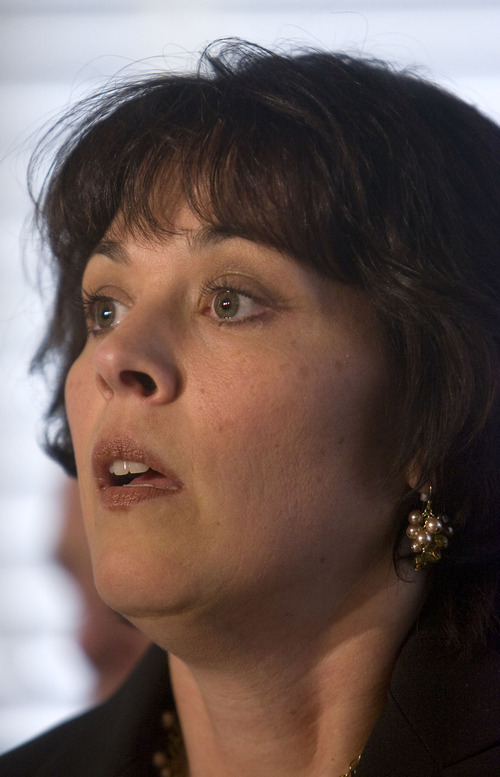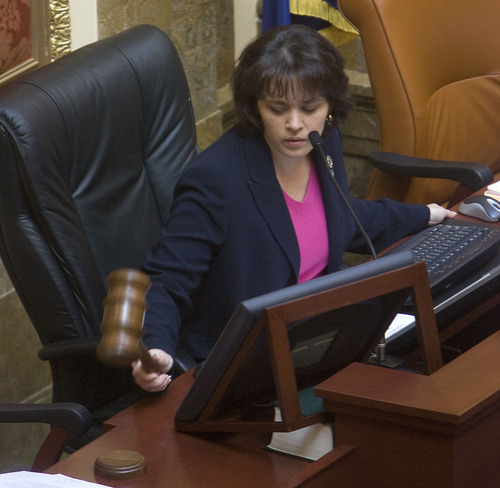This is an archived article that was published on sltrib.com in 2011, and information in the article may be outdated. It is provided only for personal research purposes and may not be reprinted.
The Utah Legislature will meet within the next few weeks to override Gov. Gary Herbert's veto of a bill earmarking an estimated $60 million in future sales tax money for road projects and could reverse other Herbert vetoes, as well.
House Speaker Becky Lockhart said Friday that the House has at least 52 members who support a veto override session, with the tax issue receiving the most support, while Senate President Michael Waddoups, R-Taylorsville, said 23 members in his body support an override session.
It takes 50 House members and 20 senators to convene an override session — a rare event that has occurred just twice in the past 15 years.
Waddoups said that most of the ballots supported overriding three or four of Herbert's vetoes, but it is unclear which of the bills had the necessary 20 votes, other than the sales tax earmark.
Lockhart, R-Provo, said that once the Legislature decides to call an override session, any of the bills that Herbert vetoed could be up for an override vote.
"What I anticipate is that all four bills will be available for us to take action on and I assume that the sponsors of the other three pieces of legislation, once they know we're going to come in for a veto override, will be more active," said Lockhart.
Lockhart and Waddoups still have to meet to hash out when the session will be. Lockhart said she prefers May 2 or 6; Waddoups would like to get it done sooner. They have until May 9 to convene the override session.
Herbert vetoed SB229, which would earmark 30 cents of every dollar of sales tax growth for road construction, arguing that it ties the hands of future legislators and steers money from other projects that rely on the state's General Fund.
"We should be clear on what this decision is about," said Allison Rowland, a budget and policy analyst with Voices For Utah Children. "It's about spending more money on roads and less money on parts of higher ed, on health, on corrections, on courts, on public safety, on services for disabled people, on all the things the General Fund supplies."
Likewise, last week Commissioner of Higher Education Bill Sederburg wrote a column in The Salt Lake Tribune arguing that steering more money to roads would hamstring other state programs and hurt fast-growing state universities that have more students and less state money.
Waddoups disagrees with those arguments, saying the bill is written to give lawmakers plenty of flexibility in how to spend the money, but does presume that it would go to roads unless legislators deem otherwise. It also puts off any potential increase in the gas tax, which typically funds road construction, he said.
Herbert also vetoed a bill intended to give insurance companies more pricing flexibility when it comes to insuring small employers — a bill the governor said would shift costs to older Utahns; another that would require state offices to be open five days a week, moving away from the current four-day week; and one aimed at using technology to connect students with potential careers.
Herbert is in China on a trade mission this week. His spokesperson could not immediately be reached for comment. Vetoes
Gov. Gary Herbert vetoed four bills from the last legislative session.
SB229 • Would earmark 30 cents of every $1 in new sales tax revenue for road projects. Herbert argued it would tie the hands of future legislators.
SB294 • Would give insurance companies more pricing flexibility when insuring small employers. The governor said it shifts cost to older customers and was rushed through the Legislature.
SB305 • Would steer college students to majors in demand from businesses.
HB328 • Would require state agencies to be accessible to the public five days a week, either physically, online or by phone. Herbert said the bill would cost $1 million but said his office would seek to expand hours.





